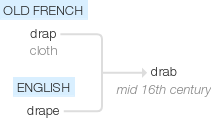Drab
mid 16th century (as a noun denoting undyed cloth): probably from Old French drap ‘cloth’ (see drape).
wiktionary
Probably from Middle French and Old French drap(“cloth”), [1] either:
The origin of the noun is uncertain; compare Middle English drabelen, drablen, draplen(“to soil; make dirty; to drag on the ground or through mud”), [6] and Low German drabbe(“dirt, mud”), drabbeln(“to soil”), and Old Norse drabba(“to make drab; make dirty”), the latter three ultimately from Proto-Germanic *drepaną(“to hit, strike”), from Proto-Indo-European *dʰreb-(“to crush, grind; to kill”). The word is also likely to be related to Dutch drab(“dregs, sediment”), Irish drabog, Scottish Gaelic drabag(“dirty woman; slattern”). [7]
The verb is derived from the noun. [8]
Probably related to drop(“small mass of liquid”).
Origin unknown.
Alteration of drag, possibly via the folk-etymological backronym "DRessed As a Girl" (with boy replacing girl).
etymonline
drab (adj.)
1715, "yellowish-gray; of the color of natural, undyed cloth," from the trade name for the color itself (1680s), which is from an earlier noun drab, drap meaning "thick, woolen cloth of a yellowish-gray color" (1540s), from French drap "cloth, piece of cloth" (see drape (v.)). The figurative sense of "dull, not bright or colorful" is by 1880.
Apparently this word is not related to earlier noun drab "a dirty, untidy woman" (1510s), "a prostitute" (1520s), which might be from Irish drabog, Gaelic drabag "dirty woman," or perhaps it is connected with Dutch and Low German drabbe "dirt;" compare drabble. The notion seems to be of dabbling in the wet and mud.
The meaning "small, petty debt" (the sense in dribs and drabs) is by 1828, of uncertain connection to the other senses.
